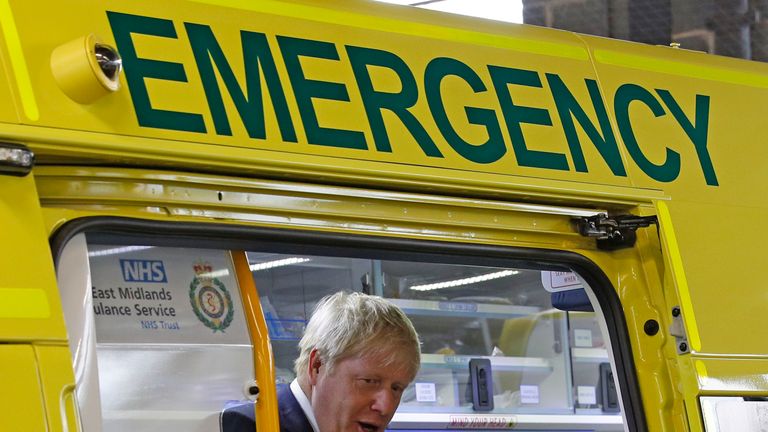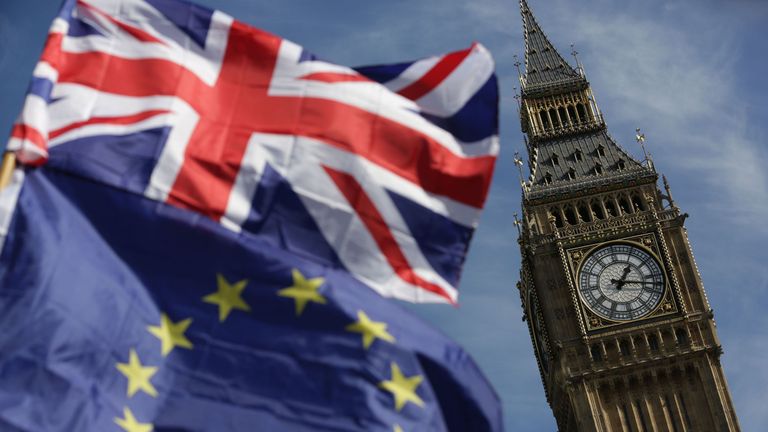How much do all of Boris Johnson’s promises cost?
Boris Johnson has made a series of eye-catching pledges on schools, hospitals and policing since entering 10 Downing Street – but how much do they all cost?
NHS
The promise: The prime minister has revealed 20 hospitals will get a share of £850m to upgrade outdated facilities and equipment.
He has also pledged a £1bn boost to NHS capital spending, allowing existing upgrade programmes to proceed and to tackle the most urgent infrastructure projects.
The cost: £1.85bn
Police
The promise: Mr Johnson is pushing for 20,000 extra police officers within the next three years.
The cost: £1.1bn
Prisons and criminal justice
The promise: The prime minister has announced a £2.5bn investment to create 10,000 extra prison places.
A further £85m will also be handed to the Crown Prosecution Service (CPS) to build capacity and manage caseloads over the next two years.
The cost: £2.6bn
Schools
The promise: In his first statement as Tory leader in the House of Commons, Mr Johnson vowed to “increase the minimum level of per pupil funding in primary and secondary schools and return education funding to previous levels by the end of this parliament”.
Although these words have not yet been followed by a formal announcement on schools funding, they suggest the prime minister intends to fulfil a pledge he made during the Conservative leadership campaign to undo billions of pounds of government cuts since 2015.
During his bid to be the next the leader, Mr Johnson promised to give England’s schools budget a £4.6bn boost per year by 2022-23.
The cost: £4.6bn per year
Brexit
The promise: Chancellor Sajid Javid has authorised more spending to prepare for a no-deal Brexit, with the Mr Johnson having promised the UK will leave the EU on 31 October “do or die”.
An immediate cash boost of £1.1bn is being provided to Whitehall departments and devolved administrations immediately, with a further £1bn available if needed.
The cost: £2.1bn
Transport
The promise: The prime minister has confirmed a new trans-Pennine route between Manchester and Leeds to “turbo-charge” regional growth.
It was part of his wider commitment to the Northern Powerhouse rail project, estimated to cost £39bn.
The cost: It is unclear how much of the total £39bn the new Manchester to Leeds line – the first part of a fast rail line spanning northern England – will cost.
Towns
The promise: In a speech in Manchester in his first few days as prime minister, Mr Johnson pledged a £3.6bn “Towns Fund” to support an initial 100 towns.
This is to provide improved transport, broadband connectivity, and “vital social and cultural infrastructure” such as libraries, art centres, parks and youth services.
Mr Johnson’s predecessor, Theresa May, had previously announced a £1.6bn Stronger Towns Fund – which was widely seen as a bid to win support among Labour MPs for her Brexit deal.
The cost: £3.6bn
Northern Ireland, Scotland and Wales
The promise: On becoming prime minister, Mr Johnson undertook a whirlwind tour of the UK ahead of which he revealed £300m of new funding for the expansion of Growth Deals across Scotland, Wales and Northern Ireland.
The cash “will open up opportunities across our union so people in every corner of the United Kingdom can realise their potential”, Mr Johnson said.
Growth Deals were first launched in 2014, with the government having already committed £2.78bn for these deals.
The cost: £300m
… And more to come?
There are still a number of promises that Mr Johnson made during his Conservative leadership campaign that he has yet to recommit to now that he is in 10 Downing Street.
This means more announcements could be coming on his previous pledges to:
- Provide full-fibre broadband “for all” by 2025, which is eight years earlier than the government’s existing target of 2033
- Raise the higher income tax rate from £50,000 to £80,000, as well as raise the point at which people start paying National Insurance. These tax changes have been estimated to cost about £10bn per year
How will these promises be funded?
Mr Johnson has highlighted the £26bn fiscal headroom, which former chancellor Philip Hammond had reserved as a no-deal Brexit “war chest”, as a means of funding some of his spending pledges.
He has promised an “economic package to boost British business” and increase overseas investment, in the hope this will swell the Treasury’s coffers.
The government has also fast-tracked a review of Whitehall spending to set departmental budgets for next year, which could allow the billions more in public spending to be made available.
Source: Read Full Article





